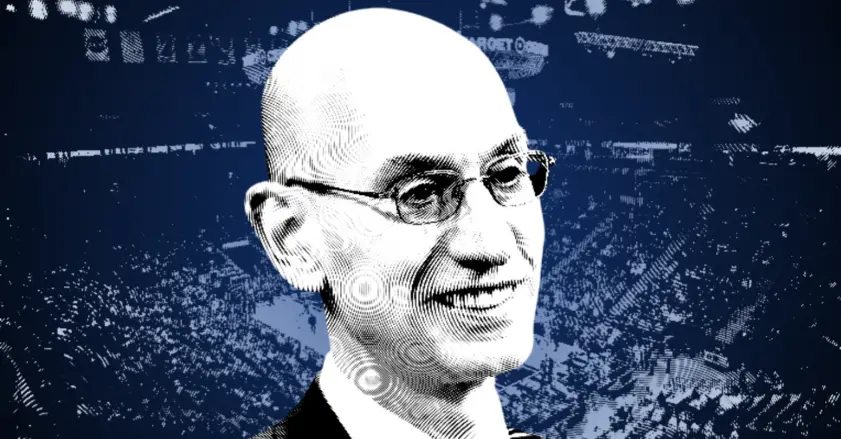The NBA has a problem making the regular season compelling. Sure, plenty of die-hard fans will pay close attention to teams around the league during the 82-game season, but that’s outweighed by the millions of average fans that don’t. There was discussion of implementing an in-season tournament to boost ratings, but the NBA and NBPA have not yet determined a prize for the winner, because no matter what happens, will anybody really care?
It’s simply undeniable: the regular season can get, well, boring. The average American sports fan simply does not need to watch the majority of an NBA season, because in retrospect it’s basically meaningless. Adam Silver needs to fix this problem. The solution? The NBA needs to bring back rivalries. How do they do that? Make divisions matter.
When you think of the all-time great rivalries in professional sports, the first that come to mind are Yankees-Red Sox, Packers-Bears, and Celtics-Lakers. One of these is different from the rest. The Celtics-Lakers rivalry is not a rivalry consisting of two teams from the same division.
This is one of the greatest rivalries in sports, but it features two teams from opposite coasts, which became a rivalry solely from how often they would face each other in the NBA Finals. But let’s face it, it’s not so much of a rivalry anymore.
Of course, there are other NBA rivalries, but many have gone dull in recent years. The Knicks and Bulls shared a storied rivalry in the 1990s, and the Warriors and Cavaliers had a brief rivalry in the 2010s, but now, we don’t have a definitive, hard-nosed feud in today’s NBA.
The biggest “rivalry” (if you can even call it that) in the NBA today would most likely be between the Warriors and the Grizzlies, because of how last year’s playoff series went. There was plenty of trash talk and taunting from both sides, and it added some flare to the series. However, the two teams matched up on Christmas day, and there wasn’t much bad blood in that game. What we thought would be an entertaining matchup has already become a bit dull.
If we’re being honest here, the NBA has gone soft. Intensity always turns up in the playoffs in any sport, but there is a huge jump in intensity in the NBA, partly because teams aren’t treating regular season games like other professional teams do. The MLB has almost double the games of an NBA season, yet every time the Yankees and Red Sox or Mets and Phillies face off, there are always some words shared between players and plenty of celebrating during big plays. It spices up the game.
Ratings will surely go up if the NBA makes divisions matter. In the MLB and NFL, the winner of each division is guaranteed a spot in the playoffs, with wild card teams following. With the NBA giving more than half of the league a legitimate shot at the playoffs with the Play-In Tournament, it wouldn’t hurt if the NBA made a rule allowing division winners a spot in the playoffs.
This was actually a rule up until 2016, when the NBA decided that conference seeding in the playoffs would strictly be determined by overall record, making divisions meaningless. This was a huge mistake.
It’s more likely that division winners would make the playoffs anyway, considering that since the rule change in 2016, at least one team from each division has made the playoffs.
Incorporating division winners will create new NBA rivalries and make the regular season far more entertaining, plus teams that may have already clinched a postseason berth will still compete for home-court advantage and make the end of the regular season watchable.
Just think about it: a normal game between the Kings and Warriors wouldn’t normally matter, but if these teams are competing for a guaranteed playoff spot or home-court advantage as a top-three seed, everyone will tune in.
A major counterargument to this is the fact that division teams face each other just four times in an 82-game season. These games still seem minuscule in the broader aspect of the season. Well, load management has also been an issue for years in the modern NBA. Teams are resting players more because of that very reason.
The solution: shorten the season. 82 games are simply too many. A 72-game season with division teams matching up in a six-game series each season means that these games would take up 24 out of 72 games in total, accounting for one-third of the season. This also reduces load management, because these regular season games would matter, and ratings would far exceed the ten games that were lost. It kills two birds with one stone.
The league has been in a solid spot for years, but ask any American sports fan if they would watch a meaningless NBA game between the Bucks and Cavaliers on ESPN, an MLB matchup between the Braves and Mets to potentially decide the winner of the NL East, or a regular season NFL game between the Chargers and Raiders, and the second and third options win almost every time.
The NFL and MLB’s regular seasons are on a different pedestal than the NBA regular season, and that needs to change. It’s an idea that would add a new sense of intensity and flare to the game.

